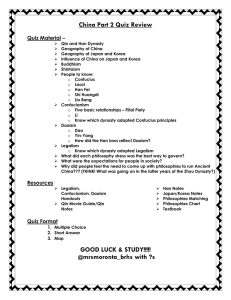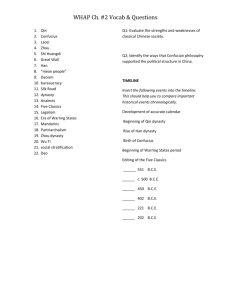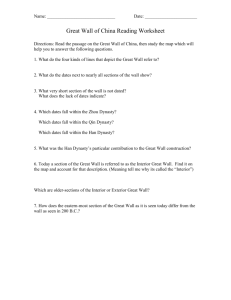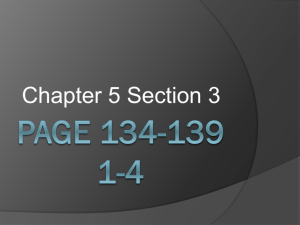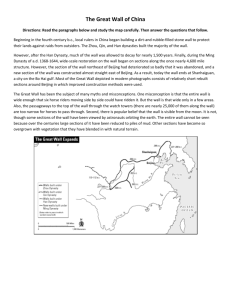Document 17600810
advertisement
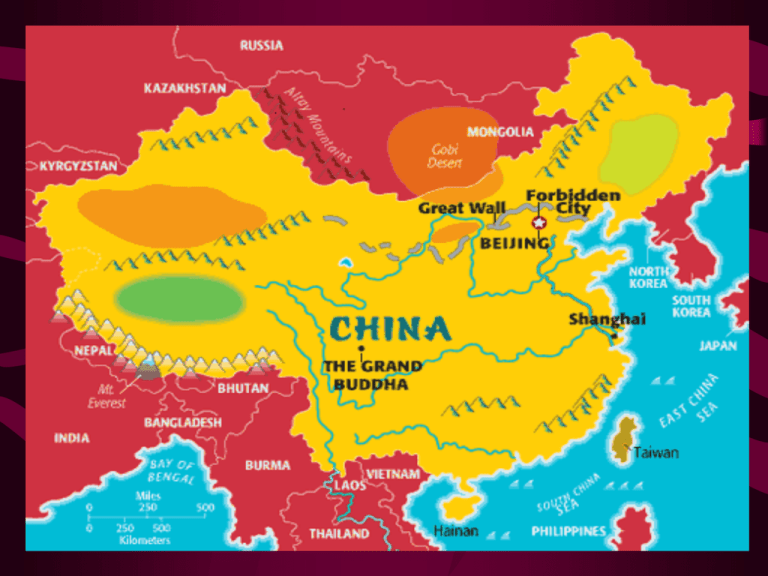
Essential Questions • How did Shi Huangdi treat people who opposed him? • Under the Chinese civil service system, who could become government officials? • Summarize the differences in how Confucius, the Legalists, and Daoists viewed government. • Explain Yin and Yang. • Explain Legalism. Classical China Three Schools of Thought Notes Confucianism - Founder • Confucius – Lived from 551 to 479 B.C.E. which was during the Zhou dynasty – Lived in eastern China Confucianism – Main Beliefs • Social order, harmony, and good government could be restored if society was organized around five basic relationships: – – – – – Ruler and subject Father and son Husband and wife Older and younger brother Friend and friend Confucianism – Main Beliefs • Children should practice filial piety, respect for their parents and elders – Still part of the general idea in Chinese culture today Confucianism - Effects • Creation of a bureaucracy, a trained civil service, in China – Education became important to career advancement • The Analects was a collection of Confucius’ teachings and sayings • Spread beyond China, influenced civilizations all over East Asia Daoism - Founder • Laozi – Believed to have lived in the 6th century B.C.E. Daoism – Main Beliefs • Natural order is more important than the social order • Human beings should live simply and in harmony with nature • True harmony comes from balancing the opposite forces of nature – Yin = “shadow” and Yang = “sunlight” • Everyone must discover the Dao, “the way”, for themselves Daoism - Effects • Daoists made contributions to astronomy and medicine • Influenced Chinese thought, writing, and art • Encouraged rulers to rule less harshly Legalism - Founder • Hanfeizi – Lived from 280 to 233 B.C.E. which was the end of the Zhou dynasty Legalism – Main Beliefs • Highly efficient and powerful government is the key to social order • Governments should control thinkers and their ideas, and enforce strict laws with rewards for good behavior and harsh punishments for bad behavior • Rulers should have absolute power and be backed by the military Legalism - Effects • The Qin dynasty seized control of China and admired Hanfeizi’s writings, they adopted strict Legalist ideas • Many people were put to death for disloyalty and other crimes Classical China Chinese Empires Notes Qin dynasty - Leaders • Qin Shihuangdi, “First Emperor of Qin” – Used Legalist ideas to control warring states and unify China – Used military might, spies, bribery, and alliances to conquer rival states – The Qin dynasty collapsed shortly after he died • Li Su, the prime minister Qin dynasty – Life in the empire • Divided territory into 36 districts – Each had three officials who governed: • One controlled the army • Another controlled the laws and agriculture • The third reported to the emperor • Murdered hundreds of Confucian scholars and burned “useless” books • Standardized writing, law, money, weights, and measure to make trade easier Qin dynasty – Great Wall of China • Built to protect the Qin dynasty from attacks by northern nomads • Took 10 years to construct the 1,400 miles of wall • Made of layers of earth pounded into wooden frames that held everything together • 300,000 men built it, some soldiers and some peasants who were forced to work Han dynasty - Leaders • Liu Bang – A rebel who had gained control of the Han kingdom and conquered the Qin army • Empress Lü – Took over control when Liu died in 195 B.C.E. – She was one of his wives Han dynasty – Government • Established a centralized government, a central authority controls the running of a state • Hundreds of commanderies, local officials of provinces, reported to central government • Lowered taxes, softened harsh punishments, moved away from Legalism • Civil service system, civilians obtain government jobs by taking examinations Han dynasty - Accomplishments • Paper was invented in 105 B.C.E., this made books cheaper and education spread • More efficient plow, iron tools, the wheelbarrow, watermills to grind grain • Government had monopolies on salt mining, iron forging, coin minting, alcohol brewing – Monopoly: complete control over the production and distribution of certain goods Han dynasty - Accomplishments • Doctors discovered a type of wine that could be used as an anesthetic • Invented the seismography, which detects earthquakes, and the magnetic compass Han dynasty - Decline • The gap between rich and poor increased due to land taxes • A series of inexperienced emperors replaced one another from 32 B.C.E. to 9 C.E. • In 220 C.E. the Han dynasty dissolved into three rival kingdoms
